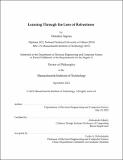Learning Through the Lens of Robustness
Author(s)
Tsipras, Dimitris
DownloadThesis PDF (35.54Mb)
Advisor
Madry, Aleksander
Terms of use
Metadata
Show full item recordAbstract
Despite their impressive performance on large-scale benchmarks, machine learning sys- tems turn out to be quite brittle outside of the exact setting in which they were developed.
How can we build ML models that are robust and reliable enough for real-world deployment?
To answer this question, we first focus on training models that are robust to small, worst-case perturbations of their input. Specifically, we consider the framework of robust optimization and study how these tools can be leveraged in the context of modern ML models. As it turns out, this approach leads us to the first deep learning models that are robust to a wide range of (small) perturbations on realistic datasets.
Next, we explore how such a paradigm of adversarially robust learning differs from the standard learning setting. As we will see, robust learning may require training a model that relies on a fundamentally different set of input features. In fact, this requirement can give rise to a trade-off between robustness and accuracy. At the same time, the features that robust models rely on turn out to be more aligned with human perception and, in turn, make these models also useful outside the context of reliability.
Finally, we move beyond the worst-case perturbation setting and investigate other robustness challenges in deploying models in the wild. On one hand, we develop general methodologies for creating benchmarks that gauge model robustness along a variety of axes, such as subpopulation shift and concept transformations. On the other hand, we explore ways to improve the reliability of our models during deployment. To this end, we study how we can bias the features that a model learns towards features that generalize to new environments. Moreover, we develop a methodology that allows us to directly rewrite the prediction rules of a model with virtually no additional data collection.
Date issued
2021-09Department
Massachusetts Institute of Technology. Department of Electrical Engineering and Computer SciencePublisher
Massachusetts Institute of Technology